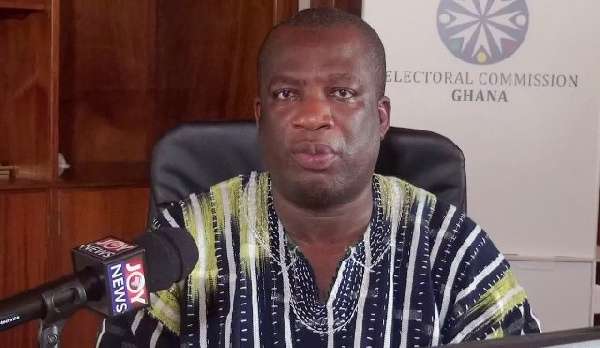According to the Electoral Commission of Ghana (EC), the only method to solve the long-standing issue of minors and foreigners on the voter list is to use Ghana Cards when registering voters.
Through the championing of this decision, the Director of Electoral Services, Dr. Serebour Quaicoe stated that the Commission is confident that the introduction of Ghana Cards will significantly reduce the number of minors and foreigners on the register.
On June 15, he was presenting at a roundtable discussion organized by the Political Science department of the College of Humanities at the University of Ghana, Legon. ‘Electronic Technology and the Future of Election in Ghana’ was the discussion’s focus.
Dr. Quaicoe expressed that the concerns of impersonation, multiple registration, and multiple voting had been largely resolved by the Commission.
“But how do we address the issue of registration of minors and the registration of foreigners?” he queried.
The majority of the time, according to the previous Director of elections for the Ashanti Region, political parties are directly involved in these violations but afterwards blame the EC of tolerating such infiltration.
“The Electoral Commission thinks that one way of addressing the issue is to use the Ghana Card. There has been a lot of arguments and we are still battling it out and we are still insistent that let us use the Ghana Card so that it will address the issue of minors.
“Because your date of birth is on the Card and the citizenship, which is also on the Card. That is also a way to reduce drastically the registration of minors and foreigners.”
Dr. Serebour Quaicoe
In September of last year, the House unanimously rejected a proposal by the EC to introduce a constitutional instrument (CI) in Parliament that would have made the Ghana Card the only document, accepted for voter registration in the 2024 elections.
Afari-Gyan Encourages EC Not To Set Up Too Many Collation Centres
Dr. Kwadwo Afari-Gyan, a former chairman of the Ghana Electoral Commission (EC) encouraged the EC to re-evaluate the need for several collation centers during the election management process.
Dr. Afari-Gyan voiced worry that having numerous collation centers could have negative effects because each center would be vulnerable to election rigging during the voting process.
Elections have been regularly tainted by controversy throughout Ghana’s history, including claims of errors made in the tallying of results. Due to difficulties experienced during the collation process, the 2020 general election saw unrest and fatalities in Techiman South. Concerns were also expressed about the actions occurring in the various collation rooms used to tabulate the results of the presidential election.
Dr. Afari-Gyan promoted the use of technology in the collation process rather than building several tiers of centers, while speaking at a session honoring the 60th anniversary of the Political Science department at the University of Ghana.
“Voter tabulation sounds like a simple and straightforward activity. However, examples from recent elections will indicate that collation centres are the most vulnerable points in manipulating election results. So, it is not desirable to set up many collation points in the results management process.
“Each collation center represents a point where results can be corrupted willfully or through mistakes. Also, the more collation centers there are, the more difficult to track changes and results.”
Dr. Kwadwo Afari-Gyan
Instead of building numerous tiers of centers, he argued that the collation process should incorporate technology. He underlined the importance of making sure the technology is compatible with the particular needs and setting of the electoral system.
READ ALSO: Kwaku Azar Criticizes The Supreme Court



















